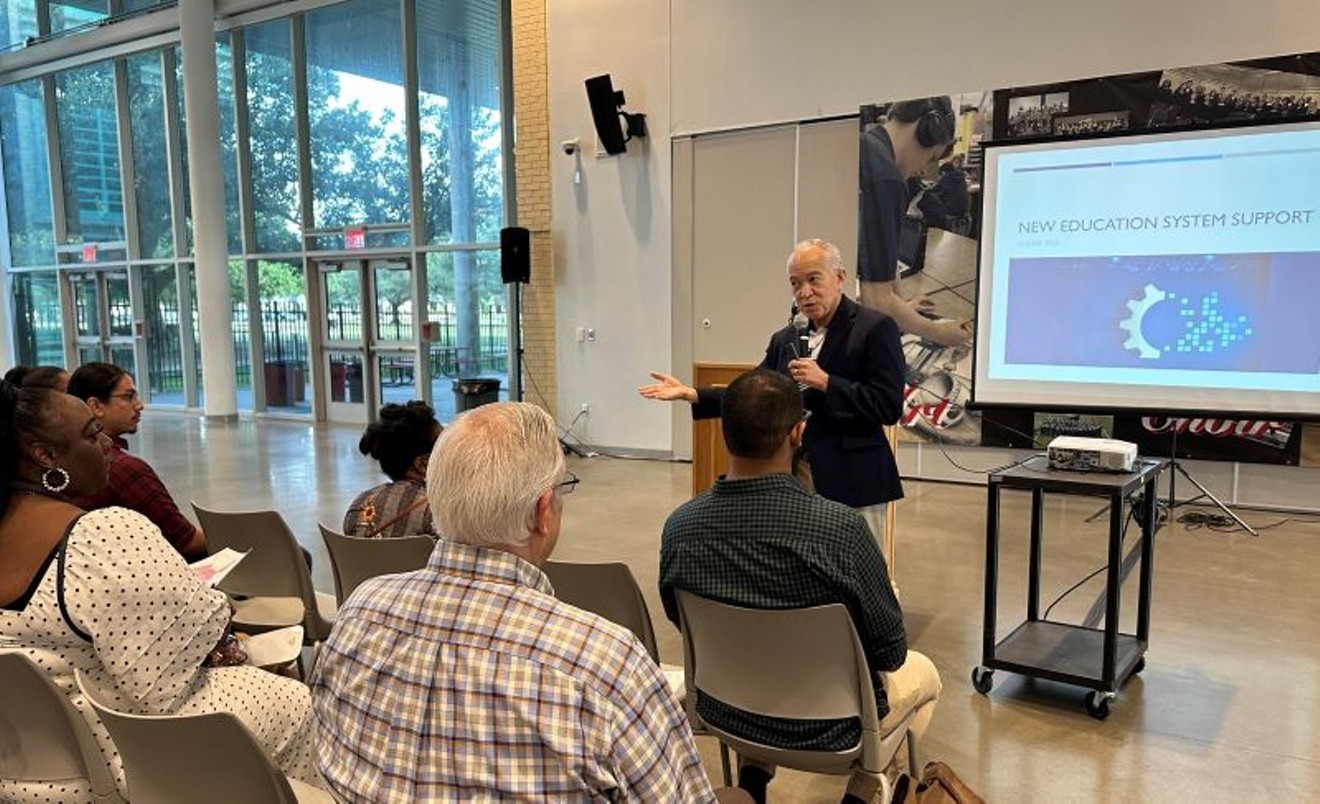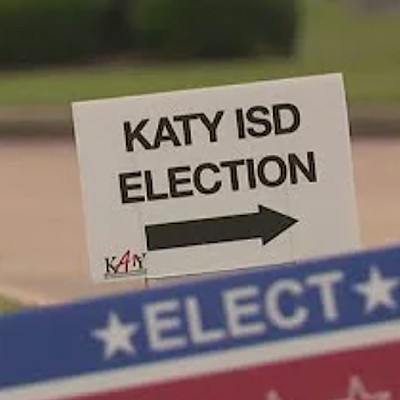Support Us
Houston's independent source of
local news and culture
account
- Welcome,
Insider - Login
- My Account
- My Newsletters
- Contribute
- Contact Us
- Sign out
Miles Names 26 More Schools to Join the NES Family in 2024-25 and Releases School Ratings
Margaret Downing January 23, 2024 5:00AM

Last June when Mike Miles was explaining to prospective teachers at a job fair what his New Education System entailed.
Photo by Margaret Downing
[
{
"name": "Related Stories / Support Us Combo",
"component": "11591218",
"insertPoint": "4",
"requiredCountToDisplay": "4"
},{
"name": "Air - Billboard - Inline Content",
"component": "11591214",
"insertPoint": "2/3",
"requiredCountToDisplay": "7"
},{
"name": "R1 - Beta - Mobile Only",
"component": "12287027",
"insertPoint": "8",
"requiredCountToDisplay": "8"
},{
"name": "Air - MediumRectangle - Inline Content - Mobile Display Size 2",
"component": "11591215",
"insertPoint": "12",
"requiredCountToDisplay": "12"
},{
"name": "Air - MediumRectangle - Inline Content - Mobile Display Size 2",
"component": "11591215",
"insertPoint": "4th",
"startingPoint": "16",
"requiredCountToDisplay": "12"
}
]
Bolstered by what he called "better than expected" improved scores in English and math from New Education System students on the national tests they took last week, Superintendent Mike Miles today released the district's own school assessment ratings and announced that 26 schools will become NES campuses next year.
Tired of waiting for school ratings assessments from the Texas Education Agency — whose release is tied up in the courts — Houston ISD today announced that it has 35 A -rated schools and 58 B-rated. Another 52 got C ratings. There were 65 D schools and 58 Fs.
Twenty of those Fs and six of those low Ds that weren't already part of the NES program will join its ranks next year. There won't be any change to their classes this year, Miles says, and teachers will not have to reapply for their jobs as was done with the initial group of 28 NES schools this year but they and their principals will undergo performance reviews, he said.
The 20 schools with F ratings (a score of 59 or below) going to NES are: Anderson Elementary, Askew Elementary, Browning Elementary, Clifton Middle, Codwell Elementary, Fonville Middle, Gregory-Lincoln Pre-K, Grissom Elementary, Kelso Elementary, Longfellow Elementary, Milne Elementary, Mitchell Elementary, Ortiz Middle, Sharpstown High, Stevens Elementary, Thomas Middle, Walnut Bend Elementary, Welch Middle, Wesley Elementary and Woodson Leadership Academy.
The six schools with low D ratings (a rating of 60 to 64) going to NES: Almeda Elementary, Crockett Elementary, Golfcrest Elementary, Northside High, Peck Elementary and Westbury High.
Another low scoring group — 24 campuses with "high Ds" (a score of 65 to 69) — will have the chance to apply for one of 14 additional NES spots. These are: Austin High, Bell Elementary, Braeburn Elementary, Deady Middle Emerson Elementary, Foerster Elementary, Frost Elementary, Gross Elementary, Hines Caldwell Elementary, Jefferson Elementary, Ketelsen Elementary, Love Elementary, Marshall Middle, Montgomery Elementary, Navarro Middle, Neff Elementary, Petersen Elementary, Reynolds Elementary, Ross Elementary, Sanchez Elementary, Shearn Elementary, Southmayd Elementary, Tinsley Elementary and Valley West Elementary.
Unlike this past year when the district was able to absorb another 57 schools that asked to be included in the program (and called NES-Aligned, although that designation is being dropped), budget limitations mean the district can only handle 14 more schools in NES in the coming year, Contrary to some reports, Miles says that in May he will present a budget with an $850 million fund balance
Encouraged by what he said were significant gains in the scores of students at NES schools on the Northwest Evaluation Association's Measures of Academic Progress tests last week, Miles clearly feels this will help make his case to parents and educators that his system of more structured classes with a centralized, set curriculum is the way to go to raise test scores and better prepare students for careers and college.
"Preliminary results show that the kids did well on NWA in English and math," He said this did not surprise him but, "The degree to which they did well did surprise me. They really knocked it out of the park." This also means that the teachers did well. "The NES schools and the NESA schools did significantly better than the non-NES schools" in terms of growth, he said.
At the same time, he said: "One set of data does not make a trend. So we've got a whole bunch of work to do. This is a good set of data but we've only been in this transformation for four and a half months. We got a long way to go."
Miles has continually dismissed as a small minority the public speakers at board meetings who complain that the new program is rote learning at its worst and with its constant testing and regimented teaching standards it both bores students and inspires fear among teachers — depictions he contests.
The NES program is particularly needed in Houston, Miles has said, because its students continue to trail in national test scores compared to those in other states. In addition, progress in closing the academic achievement gap between black and brown students versus white and Asians has been incremental to non-existent.
To come up with their ratings, HISD analysts took the data from the 2023 State of Texas Assessments of Academic Readiness tests, used the state's methodology and came up with its data.
In the past, there has been criticism from parents and teachers at some schools that their principals made the decision to join the NES program without taking into consideration what anyone else at the school had to say about it.
"We're not going to leave it to chance," Miles said. " We 're going to give [principals] the survey to give to teachers. They have to hold a teacher meeting. They have to send the survey out to the SDMC [Shared Decision-Making Committee]. They have to have a community night or a community town hall so there's several things they have to do to get input and then they can decide."
Schools will have until February 7 to let the district know whether they want to apply to become an NES school.
Teacher salaries at NES schools are higher than at non-NES but also vary depending on what subject is being taught, with an emphasis on English and math. According to HISD, starting salaries at NES elementary schools will average $75,436, middle at $89,059 and high schools at $83,816. Teacher salaries at non-NES schools will average $64,000 which includes a planned $2,500 increase for the 2024-25 school year.
The full school accountability ratings are below:
KEEP THE HOUSTON PRESS FREE...
Since we started the Houston Press, it has been defined as the free, independent voice of Houston, and we'd like to keep it that way. With local media under siege, it's more important than ever for us to rally support behind funding our local journalism. You can help by participating in our "I Support" program, allowing us to keep offering readers access to our incisive coverage of local news, food and culture with no paywalls.
Margaret Downing is the editor-in-chief who oversees the Houston Press newsroom and its online publication. She frequently writes on a wide range of subjects.
Contact:
Margaret Downing
Follow:
Facebook:
HoustonPress
Twitter:
@HoustonPress
Trending News
- HISD Scrambles As it Admits Its EOY Assessment Data is Wrong [UPDATED]
- Column: Opting Out of the STAAR Test Requires a Law Degree Or Iron Will
- Former Katy ISD Trustees Band Together To Support Two Trustees Running For Re-Election
-
Sponsored Content From: [%sponsoredBy%]
[%title%]

Don't Miss Out
SIGN UP for the latest
news, free stuff and more!
Become a member to support the independent voice of Houston
and help keep the future of the Houston Press FREE
Use of this website constitutes acceptance of our
terms of use,
our cookies policy, and our
privacy policy
The Houston Press may earn a portion of sales from products & services purchased through links on our site from our
affiliate partners.
©2024
Houston Press, LP. All rights reserved.





